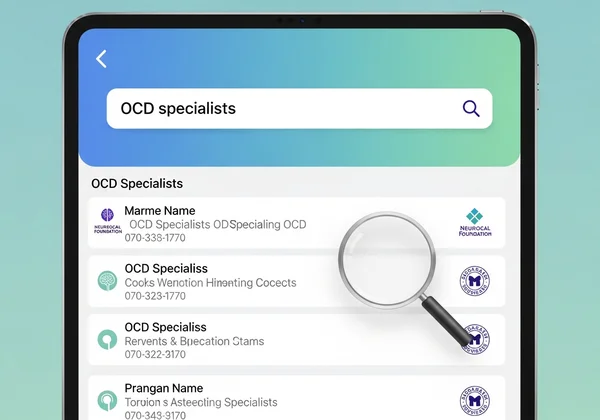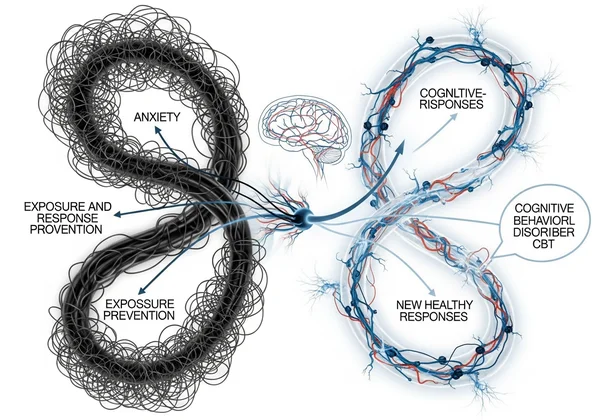OCD Test Results: How to Find the Right Therapist
November 13, 2025 | By Samuel Griffin
Taking the first step to understand your symptoms through an online OCD test can bring a mix of emotions—relief from having a name for your experiences, confusion about the results, and perhaps a bit of overwhelm. You've received your report, and now you’re likely asking, What's next after an OCD test? This guide is designed to empower you with clear, actionable steps on how to find a qualified therapist specializing in Obsessive-Compulsive Disorder (OCD), ensuring you get the professional support you deserve on your journey toward wellness.
Understanding Your Next Steps After OCD Test Results
Receiving your results is a pivotal moment. It’s not an end point, but rather the beginning of a new, informed path. Before you start your search for a therapist, it’s crucial to contextualize what your results mean and why professional guidance is the most important next step you can take.
What Your Online OCD Test Results Mean (And What They Don't)
It's essential to understand that an online screening tool, even one based on scientific principles like the OCI-R, provides a preliminary assessment. It is a powerful resource for self-reflection, helping you identify patterns of thought and behavior that may align with OCD symptoms. Think of it as a well-calibrated compass pointing you in the right direction.
However, these results are not a formal clinical diagnosis. A diagnosis can only be made by a qualified mental health professional after a comprehensive evaluation that considers your personal history, the nuances of your symptoms, and other contributing factors. Your test results are invaluable data to bring to that first appointment, giving you a structured way to start the conversation about what you've been experiencing. Properly interpreting results means seeing them as a catalyst for action, not a final verdict.

Why Professional Help is Crucial for Effective OCD Management
While understanding your symptoms is empowering, managing OCD effectively almost always requires professional intervention. OCD is a complex condition rooted in specific neurological and psychological patterns. A trained therapist can provide what a self-assessment cannot: a personalized treatment plan.
The importance of therapy for OCD cannot be overstated. Evidence-based treatments are designed to help you rewire the brain’s response to obsessive thoughts and break the cycle of compulsions. A therapist acts as your guide, providing expertise, support, and accountability as you learn the skills to manage your symptoms and reclaim your life from the grip of OCD. Self-help is a great start, but guided therapy is where profound and lasting change happens.
Finding a Qualified OCD Therapist or Specialist
Finding the right therapist is the most critical part of your treatment journey. Not all therapists are equally equipped to treat OCD. You need a specialist with specific training and experience in this area. Here’s how to find one.
Where to Look: Reputable Resources for Finding an OCD Specialist
Your search for an OCD specialist should begin with trusted sources. While a general web search can be a starting point, it’s better to use dedicated directories that vet their professionals. Look for online databases from reputable organizations like the International OCD Foundation (IOCDF), which maintains a global directory of therapists who specialize in OCD.
Other valuable resources include:
- Psychology Today's Directory: You can filter therapists by specialty (OCD) and treatments offered (ERP).
- University Psychology Clinics: Many universities have training clinics that offer lower-cost therapy from supervised graduate students.
- Your Insurance Provider: Contact your insurance company for a list of in-network mental health professionals, and then cross-reference that list to find specialists in OCD.
When you’re ready to understand your symptoms more deeply, bringing that insight to one of these specialists is your next move.

Key Credentials and Experience to Look For in an OCD Therapist
When evaluating potential therapists, look beyond their general qualifications. You need someone with specific expertise. Here are the key therapist qualifications to look for:
- Licensure: Ensure they are a licensed mental health professional (e.g., PhD, PsyD, LCSW, LMFT, LPC).
- Specialization in OCD: Ask them directly: "What percentage of your practice is dedicated to treating clients with OCD?" An experienced specialist often dedicates a significant portion of their work to it.
- Training in ERP: This is non-negotiable. Ask if they have received specific training in Exposure and Response Prevention (ERP), the gold-standard treatment for OCD.
- Collaborative Approach: The best therapists work with you as a team. They should be able to explain their treatment plan clearly and make you feel like an active participant in your recovery.
Understanding Effective OCD Therapy: ERP and CBT
To choose the right therapist, you need to know what effective OCD therapy looks like. The most proven treatments are behavioral therapies that target the core mechanisms of the disorder. An excellent ERP therapist will be well-versed in these methods.
What is Exposure and Response Prevention (ERP) for OCD?
Exposure and Response Prevention (ERP) is the most effective form of therapy for OCD. It’s a type of Cognitive Behavioral Therapy (CBT) that involves two main components. Here’s how ERP works:
- Exposure: You and your therapist will work together to gradually and systematically expose you to the thoughts, images, objects, and situations that trigger your obsessions and anxiety.
- Response Prevention: During the exposure, you make a conscious choice not to engage in the compulsive behaviors you would normally perform to reduce your anxiety.
By staying with the anxiety without "fixing" it with a compulsion, you teach your brain a powerful new lesson: the anxiety will decrease on its own, and the feared outcome you worry about doesn't happen. Over time, this process retrains your brain, and the obsessions lose their power.

How Cognitive Behavioral Therapy (CBT) Supports OCD Treatment
While ERP is the core behavioral component, broader CBT techniques for OCD are also vital. CBT helps you identify, challenge, and reframe the distorted thought patterns—or cognitive distortions—that fuel your OCD. For example, you might learn to challenge thoughts like "If I don't check the stove, the house will burn down" by examining the actual evidence and learning to tolerate the uncertainty. CBT provides the mental framework to support the behavioral work of ERP.
The Role of Medication in a Comprehensive OCD Treatment Plan
For many individuals, especially those with moderate to severe OCD, medication can be an essential part of a comprehensive treatment plan. The most commonly prescribed OCD medication options are a class of antidepressants called Selective Serotonin Reuptake Inhibitors (SSRIs). These medications can help reduce the intensity of obsessive thoughts and lower the anxiety that drives compulsions, making it easier to engage in ERP therapy. Medication should always be discussed with and prescribed by a medical doctor, preferably a psychiatrist with experience in treating OCD.
Essential Questions to Ask Your Potential OCD Therapist
Once you have a shortlist of potential therapists, it's time to interview them. A brief phone consultation is a standard practice and gives you the chance to ensure they are the right fit before committing to a full session.
Screening Questions About Their OCD Expertise and Approach
When interviewing an OCD therapist, be direct and ask specific questions about their methods. This is about your health, and you have a right to be an informed consumer. Consider asking:
- What is your training and experience in treating OCD?
- What is your approach to treating OCD? (Look for an answer centered on ERP/CBT).
- Can you walk me through what a typical ERP session would look like?
- How do you measure progress and success in treatment?
- Have you worked with clients whose OCD symptoms are similar to mine?
If you are unsure where to start, you can always go back and start your self-assessment to get a clear summary of your symptoms to discuss.

Practical Considerations: Cost, Insurance, and Availability
Don't forget the logistical details. These practical matters are crucial for ensuring you can maintain consistent treatment. Ask about:
- Fees: What is your session fee? Do you offer a sliding scale or payment plans?
- Insurance: Do you accept my insurance? If you are out-of-network, can you provide a superbill for me to submit for reimbursement?
- Availability: What are your office hours? Do you offer virtual or in-person sessions? How long is the waitlist for new clients?
Understanding the therapy cost for OCD and how it fits into your budget is a key part of planning for successful treatment.
Taking the Empowering Next Step Towards Managing Your OCD
You've already taken the courageous first step by seeking to understand your experiences. Your OCD test results have given you a starting point and a direction. Now, it's time to take the next empowering step: finding a qualified professional to guide you on the path to recovery. This journey requires commitment, but with the right support and evidence-based treatment, managing OCD and living a full, meaningful life is entirely possible.
Ready to better understand your own patterns? Take our free OCD test today and get a personalized report to share with a potential therapist.
Your Questions About Finding OCD Help Answered
Can I solely rely on my online OCD test results for a formal diagnosis?
No, you cannot. Online tests are valuable screening tools that provide insight into your symptoms and their severity, but they are not a substitute for a formal clinical diagnosis from a qualified mental health professional. A proper diagnosis involves a comprehensive evaluation of your unique history and symptoms.
What is the main difference between an OCD specialist and a general therapist?
Specialized training and experience. While a general therapist may have some knowledge of OCD, a specialist has dedicated training in evidence-based treatments like ERP and a deep understanding of the disorder's complexities. They are better equipped to create an effective, targeted treatment plan.
How long does effective OCD therapy, like ERP, typically take?
The duration varies. Treatment length depends on the severity of your symptoms, your consistency with therapy, and how actively you engage in ERP exercises between sessions. Many people start to see significant improvement within 12-20 sessions, but it is a highly individual process.
Is it possible to completely "cure" OCD, or is it more about management?
OCD is considered a chronic condition, but it is highly treatable. The goal of therapy is not to "cure" OCD in the sense of eliminating all obsessive thoughts forever. Instead, the goal is effective management—learning the skills to respond to obsessive thoughts differently so they no longer cause significant distress or interfere with your life. Many people who complete treatment achieve remission and live full lives free from the control of OCD.
What should I do if I'm struggling to afford an OCD therapist?
There are options available. Look for community mental health centers, university training clinics, or therapists who offer a sliding-scale fee based on income. Additionally, some non-profit organizations may offer grants or support. You can also start by using a free resource like our confidential test to get clarity while you explore affordable care options.